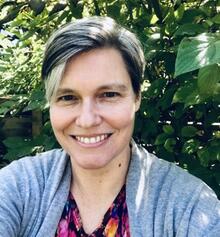For those who subscribe to what's known as the social model of disability, disability is a form of human diversity and should be thought of as an identity, just as we think of race, gender and sexual orientation as identities.
Yet disability is often thought of primarily as something that is wrong with a person or something that needs fixing through medical interventions, what is called in disability studies the medical model of disability.
 "The typical approach is around diagnosis and impairment, and then trying to fix things," says Dr. Meg Gibson, an associate professor in the School of Social Work and the Department of Social Development Studies at Renison University College, affiliated with the University of Waterloo.
"The typical approach is around diagnosis and impairment, and then trying to fix things," says Dr. Meg Gibson, an associate professor in the School of Social Work and the Department of Social Development Studies at Renison University College, affiliated with the University of Waterloo.
Gibson researches and teaches in the field of disability studies.
"The medical approach is dominant in our culture," Gibson continues. "A lot of us have learned about our relationship to disability through the language and concepts of medicine."
But as Gibson points out, disability is in many ways less about any medical diagnosis and more about the ways society treats disabled people and creates barriers to access. Disability is, in this sense, socially constructed, and so rather than the human body needing to be repaired, it is social conventions and the built environment that need to change and become accessible.
Accessibility tip: Take time to learn about how a person's intersecting identities shape their lived experience of disability.
Along with shifting views around disability as being something "abnormal" and in need of fixing, Gibson says it is also important to understand that disability is not something tragic.
"As soon as we come along with stories that make it seem that disabled people are always and only tragedies, we're making it seem like their lives aren't worth having," she says. "That's not an experience anybody would sign up for. Who would like to have their life understood as a life that was not worth living? Sometimes we do this thinking we're being compassionate or seeing disabled people as inspirational, but it's another example of thinking there is something wrong with being disabled."
While Gibson recognizes there is still lots of work to be done, she sees National AccessAbility Week and other days of observance as an important opportunity to raise awareness.
"Disability is such a big issue, and there are definitely some difficult conversations that we all need to have. But I'm encouraged by focal points like National AccessAbility Week."






